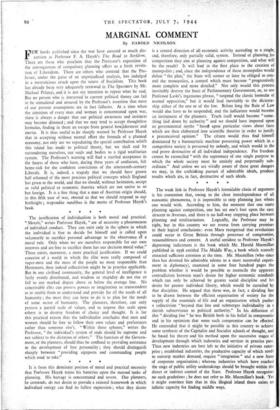It is from this dominant position of moral and practical
necessity that Professor Hayek trains his batteries upon the massed tanks of planning. His barrage is concentrated and severe. Our planners, he contends, do not desire to provide a rational framework in which individual energy can find its fullest expression ; what they desire is a central direction of all economic activity according to a single, and, therefore, only partially valid, system. Instead of .planning for competition they aim at planning against competition, and what will be the result? It will lead in the first place to the creation of monopolies ; and, since the independence of these monopolies would defeat " the plan," the State will sooner or later be obliged to con- trol the monopolies, a control which must become "progressively more complete and more detailed." Not only would this process inevitably destroy the basis of Parliamentary Government, or, to use Professor Laski's ingenuous phrase, " suspend the classic tormulz of normal opposition," but it would lead inevitably to the dictator- ship either of the one or of the few. Before long the Rule of Law would also have to be suspended, and the judicature would become :-.n instrument of the planners. Truth itself would become " some- thing laid down by authority" and we should have imposed upon us governmental myths " based upon particular views about facts which are then elaborated into scientific theories in order to justify a preconceived opinion." The citizen would thus find himself dominated by a bureaucratic machine possessing power which in a competitive society is possessed by nobody, and which would in the
end prove destructive of all individual independence. For freedom cannot be reconciled-" with the supremacy of one single purpose to which the whole society must be entirely and perpetually sub- ordinate." And unless we are vividly aware of these great dangers we may, in the unthinking pursuit of admirable ideals, produce results which are, in fact, destructive of such ideals.
* * * *


























 Previous page
Previous page